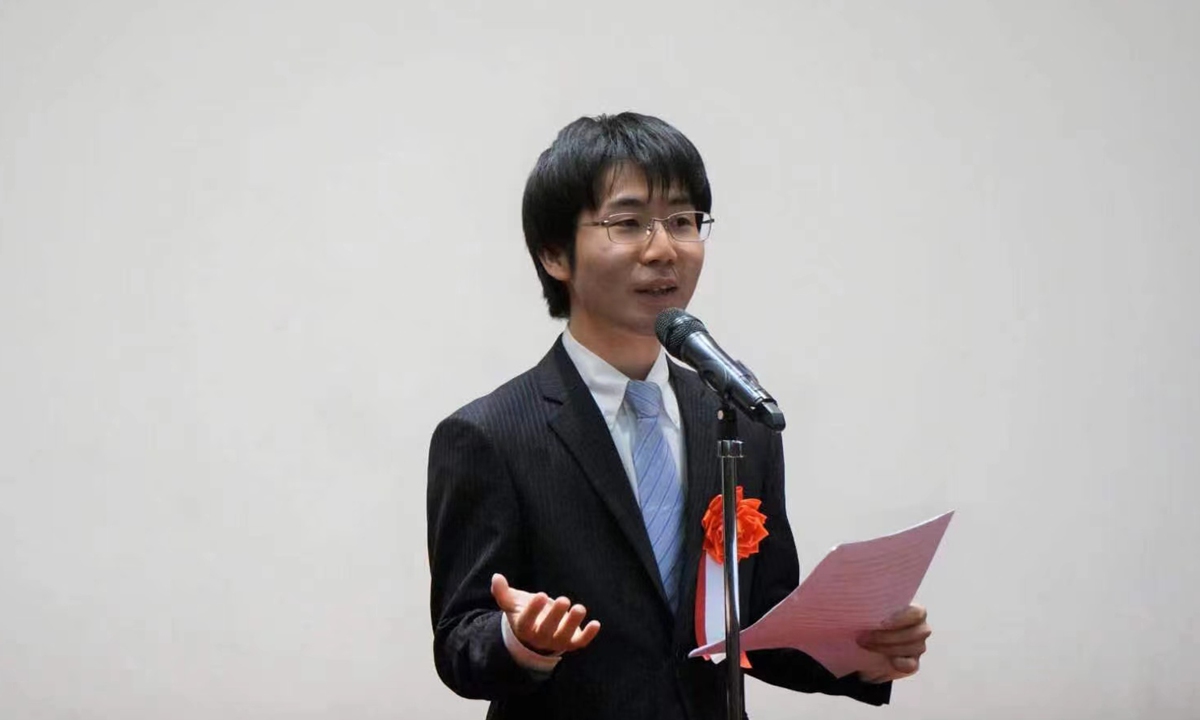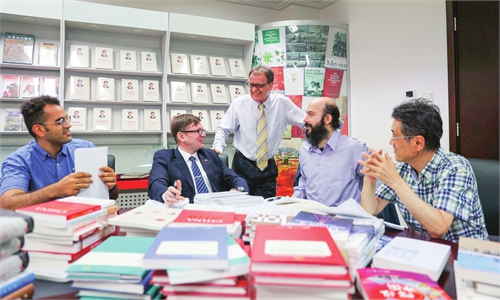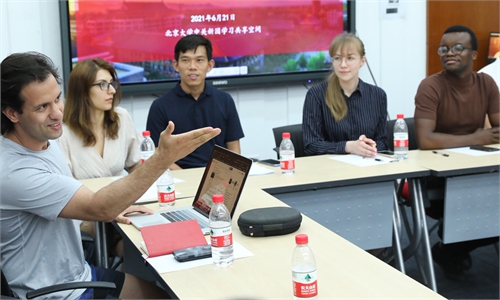Japanese youth vows to make contributions to China-Japan cross-cultural exchanges after receiving letter from Chinese President Xi Jinping
Editor's Note:
Chinese people believe that letters are as valuable as gold. For thousands of years, letters, across mountains and oceans, have been delivering the writers' sentiments, friendship, and expectations.
During the past decade, Xi Jinping, general secretary of the Communist Party of China (CPC) Central Committee and Chinese president, has managed to find time to reply to some letters from ordinary people despite his busy work schedule.
Through his letters, Xi has also corresponded with international friends from all walks of life on numerous occasions, part of a series of excellent stories of China's international exchanges in the new era. The letters have also added vivid color to the diplomacy between China and other countries in the last decade.
Over the last few months, the Global Times reporters traced and contacted some of the recipients of Xi's letters, to hear the inspiring stories behind the letters and their contents.

Nakashima has, on multiple occasions, participated in China-related essay contests and visited China.
In 2019, he wrote a letter to Chinese President Xi Jinping ahead of his trip to Japan for the G20 summit in Osaka.
In his letter, Nakashima extended his greetings and best wishes to the Chinese president, and expressed his willingness to devote himself to the cause of China-Japan friendship.
Xi, in his reply, said he was glad to see that Nakashima had been studying Chinese language and literature and that by participating in essay contests and exchange activities in China, he had learned more about China and strengthened his bonds with Chinese friends.
Noting that China and Japan are close neighbors separated by only a narrow strip of water, he said the friendship between the two countries is rooted in the people, and that the future of the friendship between the two peoples is in the hands of the young people.
Xi said he hoped that the youth of China and Japan would strengthen exchanges and mutual learning, enhance mutual understanding, develop long-lasting friendships, and contribute to creating an even brighter future for bilateral relations.
Xi also encouraged Nakashima to continue to promote China-Japan friendship.
Nakashima told the Global Times that he was "super" honored when seeing the Chinese President's reply. "I received the letter in Tokyo. It was just like a dream," Nakashima recalled.
He further revealed that in the letter sent to President Xi, Nakashima said his actual experience in China had overturned his previous stereotypes on China, such as "China has serious environmental pollution" and "many Chinese people speak loudly and behave impolitely," but he instead saw the blue sky in Beijing and hospitable Chinese people.
The face-to-face exchanges between people and mutual understanding based on communication are very important for the peaceful development of both countries, Nakashima said in the letter, expressing wishes to make contributions in future to friendly Japan-China relations.
Before writing to President Xi, Nakashima had twice been to China as an exchange student. He first attended a two-week exchange program in Nankai University in North China's Tianjin in 2011 when he was a college freshman, and then went to Fudan University in Shanghai six years later.
Having chosen Chinese literature as his college mayor, Nakashima told the Global Times that his favorite Chinese writer is Yu Hua and Yu's works such as To Live and Brothers helped him with writing skills and deepened his understanding of Chinese culture.
Inspired by his experience in China and encouraged by President Xi's reply, Nakashima published his maiden work, Polaris of the Boundary, a children's novel which tells the story of a Chinese girl who was born in China and moved to a Japan with her mother at an early age.
Nakashima told the Global Times that numerous Chinese elements in the novel, such as the song "Qilixiang" by Chinese singer Jay Chou and the Bund in Shanghai, all came from his real life in China and stories from his Chinese friends.
"My Chinese classmates were very eager to help me adapt to life in China when I lived in the student dormitory in Fudan University. They explained when I didn't understand in the class and took me to buy a Chinese SIM card," recalled Nakashima, saying he is still in touch with his Chinese friends and they talk about each other's life and cultural exchanges between China and Japan from time to time.
As 2022 marks the 50th anniversary of the normalization of China-Japan relations, Nakashima told the Global Times he hopes Japan and China can establish an exchange channel which is distinguished from political and economic ones and focuses on communication for ordinary people.
Nakashima said Japanese media reports tend to focus on political and economic topics and Japanese readers can hardly feel the real and ordinary life of Chinese people. "Recently in Japan, there has been a tendency toward negative news reports about China. I think it has much to do with the limited direct communication between Japanese and Chinese people which has been blocked by the COVID-19 pandemic," Nakashima noted.
"Personally, I will continue to make my contributions in promoting cross-cultural exchanges between Japan and China's young people," said Nakashima.
Chinese people believe that letters are as valuable as gold. For thousands of years, letters, across mountains and oceans, have been delivering the writers' sentiments, friendship, and expectations.
During the past decade, Xi Jinping, general secretary of the Communist Party of China (CPC) Central Committee and Chinese president, has managed to find time to reply to some letters from ordinary people despite his busy work schedule.
Through his letters, Xi has also corresponded with international friends from all walks of life on numerous occasions, part of a series of excellent stories of China's international exchanges in the new era. The letters have also added vivid color to the diplomacy between China and other countries in the last decade.
Over the last few months, the Global Times reporters traced and contacted some of the recipients of Xi's letters, to hear the inspiring stories behind the letters and their contents.

Daichi Nakashima Photo: courtesy of Nakashima
"If I hadn't received a letter from President Xi, or if I hadn't become attached to China, my life might not have been so wonderful," Daichi Nakashima, a Japanese youth who studied Chinese language and literature in college, told the Global Times.Nakashima has, on multiple occasions, participated in China-related essay contests and visited China.
In 2019, he wrote a letter to Chinese President Xi Jinping ahead of his trip to Japan for the G20 summit in Osaka.
In his letter, Nakashima extended his greetings and best wishes to the Chinese president, and expressed his willingness to devote himself to the cause of China-Japan friendship.
Xi, in his reply, said he was glad to see that Nakashima had been studying Chinese language and literature and that by participating in essay contests and exchange activities in China, he had learned more about China and strengthened his bonds with Chinese friends.
Noting that China and Japan are close neighbors separated by only a narrow strip of water, he said the friendship between the two countries is rooted in the people, and that the future of the friendship between the two peoples is in the hands of the young people.
Xi said he hoped that the youth of China and Japan would strengthen exchanges and mutual learning, enhance mutual understanding, develop long-lasting friendships, and contribute to creating an even brighter future for bilateral relations.
Xi also encouraged Nakashima to continue to promote China-Japan friendship.
Nakashima told the Global Times that he was "super" honored when seeing the Chinese President's reply. "I received the letter in Tokyo. It was just like a dream," Nakashima recalled.
He further revealed that in the letter sent to President Xi, Nakashima said his actual experience in China had overturned his previous stereotypes on China, such as "China has serious environmental pollution" and "many Chinese people speak loudly and behave impolitely," but he instead saw the blue sky in Beijing and hospitable Chinese people.
The face-to-face exchanges between people and mutual understanding based on communication are very important for the peaceful development of both countries, Nakashima said in the letter, expressing wishes to make contributions in future to friendly Japan-China relations.
Before writing to President Xi, Nakashima had twice been to China as an exchange student. He first attended a two-week exchange program in Nankai University in North China's Tianjin in 2011 when he was a college freshman, and then went to Fudan University in Shanghai six years later.
Having chosen Chinese literature as his college mayor, Nakashima told the Global Times that his favorite Chinese writer is Yu Hua and Yu's works such as To Live and Brothers helped him with writing skills and deepened his understanding of Chinese culture.
Inspired by his experience in China and encouraged by President Xi's reply, Nakashima published his maiden work, Polaris of the Boundary, a children's novel which tells the story of a Chinese girl who was born in China and moved to a Japan with her mother at an early age.
Nakashima told the Global Times that numerous Chinese elements in the novel, such as the song "Qilixiang" by Chinese singer Jay Chou and the Bund in Shanghai, all came from his real life in China and stories from his Chinese friends.
"My Chinese classmates were very eager to help me adapt to life in China when I lived in the student dormitory in Fudan University. They explained when I didn't understand in the class and took me to buy a Chinese SIM card," recalled Nakashima, saying he is still in touch with his Chinese friends and they talk about each other's life and cultural exchanges between China and Japan from time to time.
As 2022 marks the 50th anniversary of the normalization of China-Japan relations, Nakashima told the Global Times he hopes Japan and China can establish an exchange channel which is distinguished from political and economic ones and focuses on communication for ordinary people.
Nakashima said Japanese media reports tend to focus on political and economic topics and Japanese readers can hardly feel the real and ordinary life of Chinese people. "Recently in Japan, there has been a tendency toward negative news reports about China. I think it has much to do with the limited direct communication between Japanese and Chinese people which has been blocked by the COVID-19 pandemic," Nakashima noted.
"Personally, I will continue to make my contributions in promoting cross-cultural exchanges between Japan and China's young people," said Nakashima.


